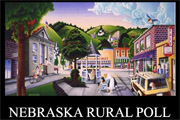Agricultural Economics, Department of

Nebraska Rural Poll
Date of this Version
10-2022
Document Type
Report
Citation
Nebraska Rural Poll, Research Report (October 2022) 22-1, 34 pages
Institute of Agriculture and Natural Resources, University of Nebraska-Lincoln
Also available at http://ruralpoll.unl.edu/pdf/22economy.pdf
Abstract
Most rural Nebraskans believe most of the listed economic items will become worse or much worse over the next 12 months when asked in May and June. Almost nine in ten think the following will become worse: inflation, gasoline or diesel fuel prices, grocery prices, and interest rates. In fact, at least four in ten rural Nebraskans believe the following items will become much worse in the next 12 months: gasoline or diesel fuel prices, inflation, grocery prices, and healthcare costs. The two items that had less than one-half believing they would become worse or much worse during the next year include their personal financial situation and your personal job prospects.
Economic expectations differ by many characteristics. Residents of the North Central region are more likely than persons living in other regions of the state to believe economic growth will become worse during the next year. Meanwhile, persons living in or near mid-sized communities are more likely than persons living in or near smaller or larger communities to believe housing costs will become worse during the next year. Perhaps of most concern is that persons with the lowest household incomes are more likely than persons with higher incomes to believe their personal financial situation will become worse during the next year. In fact, over six in ten persons with household incomes under $40,000 think their personal financial situation will become worse, compared to just over one-quarter of persons with the highest household incomes.
Despite this concern over the economy, few rural Nebraskans are currently making or considering employment changes. Approximately three in 20 rural Nebraskans are actively seeking a better paying job, actively looking to change jobs, actively planning to retire or leave the workforce, planning to retire early, or actively seeking a job with flexible work arrangements. Just over one in ten are actively planning to start their own business or self-employment activity. Less than one in ten are actively seeking a job with less hours or one with more hours.
Some groups are more likely to be considering employment changes, though. Persons between the ages of 30 and 39 are the age group most likely to be actively seeking a job with flexible work arrangements. And, younger persons are more likely than older persons to be actively seeking a better paying job, actively seeking a job with more hours, and actively looking to change jobs. Almost three in ten persons under the age of 40 are actively seeking a better paying job. Just over one-quarter of persons age 19 to 29 are actively looking to change jobs.
When asked what employment characteristics are most important, rural Nebraskans most value feeling appreciated, the type of work, safety, autonomy, and opportunities to advance or improve. Most rural Nebraskans rate the following employment characteristics as very important: values your work, focuses on safety in the workplace, gives you meaningful work, gives you opportunities to advance your career, has a sense of belonging among employees, gives control over the tasks you do, and offers professional development or career training.
The characteristics most valued by rural Nebraskans are also done by their current employer. Most rural Nebraskans say their current employer does the following: focuses on safety in the workplace, gives control over the tasks they do, values their work, gives them meaningful work, and gives opportunities to advance their career.
Included in
Agribusiness Commons, Agricultural and Resource Economics Commons, Civic and Community Engagement Commons, Community-Based Research Commons, Demography, Population, and Ecology Commons, Entrepreneurial and Small Business Operations Commons, Place and Environment Commons, Public Affairs, Public Policy and Public Administration Commons, Regional Economics Commons, Rural Sociology Commons

